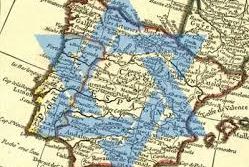- Business
- Childbirth & Education
- Legal Formalities
- Motoring
- Other
- Pensions & Benefits
- Property & Accommodation
- Taxes
- Airports and Airlines Spain
- Paramount Theme Park Murcia Spain
- Corvera International Airport Murcia Spain
- Join us for Tea on the Terrace
- When Expat Eyes Are Smiling
- Meet Wincham at The Homes, Gardens & Lifestyle Show, Calpe
- QROPS 2014
- Spain Increases IHT in Valencia & Murcia
- Removals to Spain v Exports from Spain
- The Charm of Seville
- Gibraltar Relations
- Retiro Park : Madrid
- Community Insurance in Spain
- Calendar Girls
- Considerations when Insuring your Boat in Spain
- QROPS – HMRC Introduces changes that create havoc in the market place
- QROPS – All Change From April 2012
- Liva & Laia : 15th November

On December 16, 1968, the Spanish government formally revoked the 1492 Alhambra Decree, also known as the Edict of Expulsion, which sent the Jews of Aragon and Castile into exile.
Although technically the Inquisition had been dismantled with the passage into law of Spain’s constitution of 1869, which abolished religious discrimination, it was not until this 1968 legislation that the regime of Francisco Franco explicitly invited Jews to come and openly practice their faith in Spain. Before this date, for example, at least on paper, Jews needed permission from the state to conduct public prayer services.
The Alhambra Decree had been issued by King Ferdinand II and Queen Isabella on March 31, 1492. It gave the country’s Jews until July 31 of that year to depart “with their sons and daughters and manservants and maidservants and relatives, big and small … and not dare to return.”
Alternately, they could convert to Roman Catholicism, but after a century during which thousands of Jews had already done just that, it was clear to all that so-called New Christians would always be under suspicion of Judaizing – secretly practicing Judaism in some form.
It was for the purpose of rooting out crypto-Jews and other varieties of Gentile heretics that the Church in Rome had allowed the Spanish crown to establish the Inquisition in 1478. Its powers were far-reaching and included the ability to sentence enemies of the faith to death.
One development that made the reconciliation with Judaism possible was the Second Vatican Council, which in 1965 released the document Nostra Aetate (In Our Time) that reformed many elements of Catholic doctrine. Nostra Aetate stressed that the Jews could not be held responsible for the crucifixion of Jesus, and that, contrary to some Catholic teachings over the millennia, the Jews were not an accursed people.
Three years later, the reading of the proclamation voiding the Edict of Expulsion was given an especially festive and public venue. Signed by Spain’s justice minister at the time, Antonio Oriol, the document stated that the Jewish religion was now officially registered, in keeping with a religious-liberty law introduced two years earlier that opened Spanish society to other religions than Roman Catholicism.
The occasion for the reading of the proclamation was the opening ceremony for Beth Yaacov Synagogue in Madrid. Beth Yaacov, which was built at a cost of $250,000, some of that raised locally, some of it provided through the Claims Conference, was Spain’s first new synagogue in 600 years.
The ceremony was attended by around 600 VIPs, both Jews from Spain’s tiny Jewish community and other nearby countries, and non-Jews representing the other religions in Spain. Receiving the declaration on behalf of the Jews was the vice president of the Madrid Jewish community, Samuel Toledano, who was a direct descendant of Rabbi Daniel Toledano, the rabbi of the city of Toledo at the time of the expulsion.
By 1968 already around 8,000 Jews lived in Spain, some of them immigrants from Morocco for whom life had become increasingly uncomfortable following the Arab-Israeli wars of 1956 and 1967.
In the decades that followed, Spain took other measures to make Jews more welcome, the most significant of them a 2014 law meant to “compensate for shameful events in the country’s past.”
According to the new law, Jews who can prove their descent from the Sephardi Jews expelled in 1492 are eligible for Spanish citizenship. Most notably, they can apply for a Spanish passport without having to be resident in the country and without having to relinquish citizenship in another country.
Today, Spain has an estimated 18,000 Jewish residents out of an overall population of nearly 48 million.
Recommended Reading :
* Spanish academy appoints 6 Jewish academics
* Spain gives Citizenship to thousands with Sephardic roots










